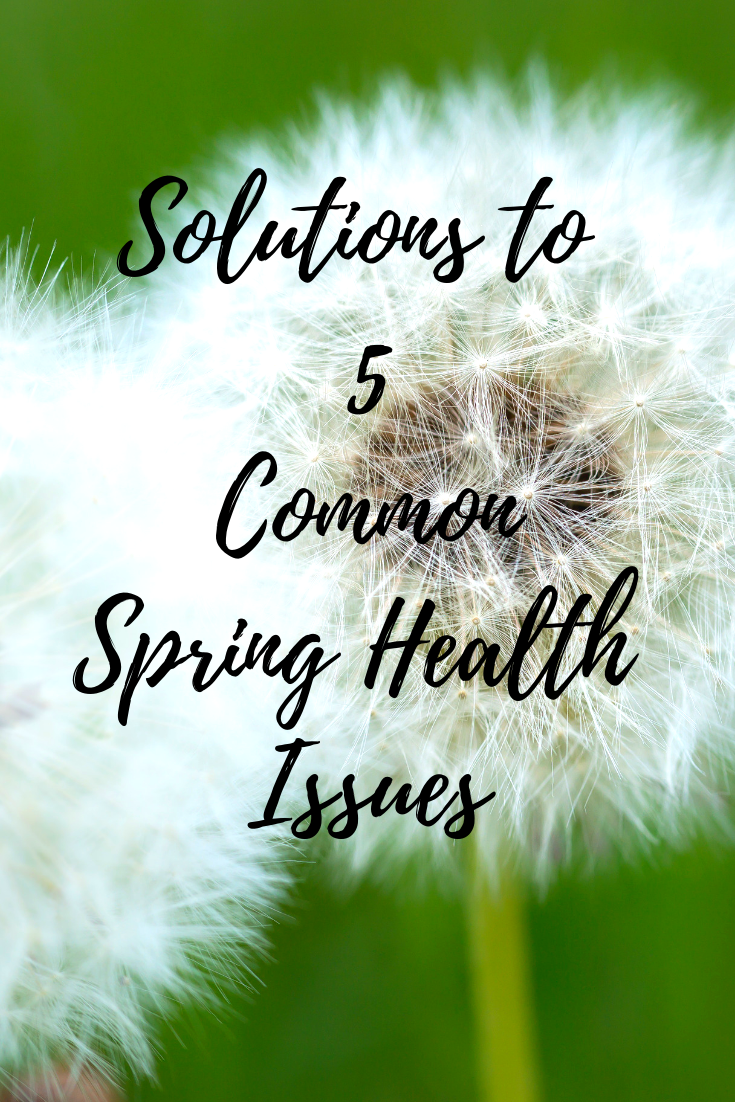
While many of us in the midwest are finally thawing from the crazy polar vortex that kept us inside with our furnaces on high, some parts of the country are now preparing for spring. When spring comes along, many parents are happy to finally be done with the cold weather including cleaning up the ever present slush and puddles left from snow, getting their children dressed in layers upon layers, lugging around all those extra pieces for recess at school, and those stomach bugs that seem to continue getting passed from family to family. Unfortunately, spring means tackling different issues like the host of allergens in the air, especially pollen and dust among other things.
While such health problems are natural, there’s no reason why you have to wait them out. Here are some of the most common spring health issues and how to be prepared!
Image Source: https://pixabay.com/en/allergy-medical-allergic-allergen-1738191/
1. The Common Cold
The common cold is well-named, as just about every person will experience it at some time, most likely on a yearly basis! This causes a number of symptoms but is also famed for having no definite cure. Spring is the time when it strikes the hardest, as our immune systems are weakened right after winter. This condition could lead to coughing, fever, sneezing, headaches, and more. Needless to say, we don’t need any of that in our daily lives.
If you or your child does get a cold, make sure you get enough sleep and fluids to help your body recover more quickly. Also make sure you are sanitizing surfaces in your home to prevent the spread of bacteria and viruses. To further prevent future colds, practice proper hand-washing techniques, eat a diet high in fruit and vegetables, and include a multi-vitamin in your daily routine.
2. Sports Injuries
Image Source:https://pixabay.com/en/football-injury-pain-teammate-help-3689660/
With spring coming around, kids are likely to get into more outdoor activities. These could include contact sports like football, soccer, baseball, tennis, and baseball. While getting out and playing sports is wonderful for helping to keep yourself in shape, it also leads to an increased risk of sports injuries.
To avoid such injuries, which could be major health issues, it’s best to keep your body conditioned throughout the year. Perform exercises indoors in the winter, or have everyone playing a certain sport throughout the year. Warming up and cooling down are also essential practices if you want to play sports safely. Have your mini-athletes stay limber by stretching regularly or try to keep them strong year round by choosing winter activities they can do. Gymnastics, basketball, and swimming are wonderful sports they can do indoors in the winter. Even regularly playing outside, as weather permits, sledding, building snowmen, trying skiing, snowshoeing, or ice skating can also keep them in shape.
3. Cold Sores
Cold sores are a type of herpes or an infection that affects the mouth area. These tiny blisters are both unsightly and painful, caused by seasonal changes and stress. They usually go away in around three weeks, but they can also attack up to three times a year. You can reduce the risk of cold sores by washing hands on a frequent basis.
Another important preventative method is to avoid sharing anything that comes in contact with the mouth, such as glasses, water bottles, spoons, chapstick, etc. Remind your children that sharing is not always caring! To remain completely safe and keep your family healthy as well, you can use cold sore creams to prevent the present sores from progressing further.
4. Seasonal Allergies
The blossoming flowers, budding trees, and other re-emerging signs of life release a lot of allergens into the air. This problem could start causing health issues as early as February and result in seasonal allergies. There are a lot of medicinal remedies for this but if you want to consult a healthcare professional, it’s worthwhile to look for the best allergy specialist in Parker.
If you or your child does suffer from seasonal allergies, start the therapy around two weeks prior to the spring weather comes around. That way it will already be in your system before you even experience symptoms. Get a decent air purifier, clean out the mold, and don’t let any pollen into your house. You may also wish to have some form of sinus relief in the home too, these rinses and washes https://serp.co/best/sinus-

5. Asthma
Similar to seasonal allergies, asthma also tends to flare up more seriously in the springtime. The insect repellants, changes in temperature, and pollen are all culprits here, so you have to protect yourself from outside elements. You may need to begin taking an allergy medication to help prevent asthma attacks.
The real cause for concern comes when one has to use their inhaler more than twice in one week. If this is the case, make sure to visit a doctor as soon as possible. You may need a different type of inhaler or a preventative. If possible, keep a peak flow meter at all times so you can measure the movement of air to and from your lungs.
I hope these tips help you to be prepared for whatever you may face this coming spring!
This article was written in conjunction with Airto
Zamorano who is the CEO and Co-Founder ofNumana SEOand Numana Medical. He is
an experienced business leader and digital marketer with a track record of
success.

